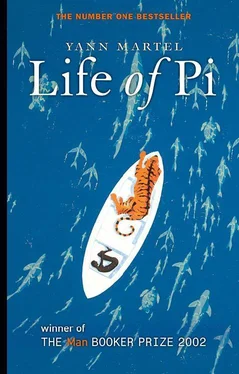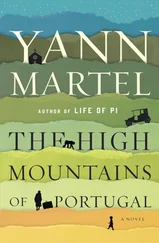Yann Martel - Life of Pi
Здесь есть возможность читать онлайн «Yann Martel - Life of Pi» весь текст электронной книги совершенно бесплатно (целиком полную версию без сокращений). В некоторых случаях можно слушать аудио, скачать через торрент в формате fb2 и присутствует краткое содержание. Год выпуска: 2002, ISBN: 2002, Издательство: Canongate Books, Жанр: Современная проза, на английском языке. Описание произведения, (предисловие) а так же отзывы посетителей доступны на портале библиотеки ЛибКат.
- Название:Life of Pi
- Автор:
- Издательство:Canongate Books
- Жанр:
- Год:2002
- ISBN:9781847674210
- Рейтинг книги:3 / 5. Голосов: 1
-
Избранное:Добавить в избранное
- Отзывы:
-
Ваша оценка:
- 60
- 1
- 2
- 3
- 4
- 5
Life of Pi: краткое содержание, описание и аннотация
Предлагаем к чтению аннотацию, описание, краткое содержание или предисловие (зависит от того, что написал сам автор книги «Life of Pi»). Если вы не нашли необходимую информацию о книге — напишите в комментариях, мы постараемся отыскать её.
Life of Pi — читать онлайн бесплатно полную книгу (весь текст) целиком
Ниже представлен текст книги, разбитый по страницам. Система сохранения места последней прочитанной страницы, позволяет с удобством читать онлайн бесплатно книгу «Life of Pi», без необходимости каждый раз заново искать на чём Вы остановились. Поставьте закладку, и сможете в любой момент перейти на страницу, на которой закончили чтение.
Интервал:
Закладка:
I looked up at the sky. The cloud cover had vanished. But for a few wisps on the horizon, the sky was clear. It would be another hot, rainless day. The sea moved in a lethargic way, as if already exhausted by the oncoming heat.
I sat against the mast and thought over our problem. The biscuits and the fishing gear assured us of the solid part of our diet. It was the liquid part that was the rub. It all came down to what was so abundant around us but marred by salt. I could perhaps mix some sea water with his fresh water, but I had to procure more fresh water to start with. The cans would not last long between the two of us—in fact, I was loath to share even one with Richard Parker—and it would be foolish to rely on rainwater.
The solar stills were the only other possible source of drinkable water. I looked at them doubtfully. They had been out two days now. I noticed that one of them had lost a little air. I pulled on the rope to tend to it. I topped off its cone with air. Without any real expectation I reached underwater for the distillate pouch that was clipped to the round buoyancy chamber. My fingers took hold of a bag that was unexpectedly fat. A shiver of thrill went through me. I controlled myself. As likely as not, salt water had leaked in. I unhooked the pouch and, following the instructions, lowered it and tilted the still so that any more water from beneath the cone might flow into it. I closed the two small taps that led to the pouch, detached it and pulled it out of the water. It was rectangular in shape and made of thick, soft, yellow plastic, with calibration marks on one side. I tasted the water. I tasted it again. It was salt-free.
“My sweet sea cow!” I exclaimed to the solar still. “You’ve produced, and how! What a delicious milk. Mind you, a little rubbery, but I’m not complaining. Why, look at me drink!”
I finished the bag. It had a capacity of one litre and was nearly full. After a moment of sigh-producing, shut-eyed satisfaction, I reattached the pouch. I checked the other stills. Each one had an udder similarly heavy. I collected the fresh milk, over eight litres of it, in the fish bucket. Instantly these technological contraptions became as precious to me as cattle are to a farmer. Indeed, as they floated placidly in an arc, they looked almost like cows grazing in a field. I ministered to their needs, making sure that there was enough sea water inside each and that the cones and chambers were inflated to just the right pressure.
After adding a little sea water to the bucket’s contents, I placed it on the side bench just beyond the tarpaulin. With the end of the morning coolness, Richard Parker seemed safely settled below. I tied the bucket in place using rope and the tarpaulin hooks on the side of the boat. I carefully peeked over the gunnel. He was lying on his side. His den was a foul sight. The dead mammals were heaped together, a grotesque pile of decayed animal parts. I recognized a leg or two, various patches of hide, parts of a head, a great number of bones. Flying-fish wings were scattered about.
I cut up a flying fish and tossed a piece onto the side bench. After I had gathered what I needed for the day from the locker and was ready to go, I tossed another piece over the tarpaulin in front of Richard Parker. It had the intended effect. As I drifted away I saw him come out into the open to fetch the morsel of fish. His head turned and he noticed the other morsel and the new object next to it. He lifted himself. He hung his huge head over the bucket. I was afraid he would tip it over. He didn’t. His face disappeared into it, barely fitting, and he started to lap up the water. In very little time the bucket started shaking and rattling emptily with each strike of his tongue. When he looked up, I stared him aggressively in the eyes and I blew on the whistle a few times. He disappeared under the tarpaulin.
It occurred to me that with every passing day the lifeboat was resembling a zoo enclosure more and more: Richard Parker had his sheltered area for sleeping and resting, his food stash, his lookout and now his water hole.
The temperature climbed. The heat became stifling. I spent the rest of the day in the shade of the canopy, fishing. It seems I had had beginner’s luck with that first dorado. I caught nothing the whole day, not even in the late afternoon, when marine life appeared in abundance. A turtle turned up, a different kind this time, a green sea turtle, bulkier and smoother-shelled, but curious in the same fixed way as a hawksbill. I did nothing about it, but I started thinking that I should.
The only good thing about the day being so hot was the sight the solar stills presented. Every cone was covered on the inside with drops and rivulets of condensation.
The day ended. I calculated that the next morning would make it a week since the Tsimtsum had sunk.
CHAPTER 63
The Robertson family survived thirty-eight days at sea. Captain Bligh of the celebrated mutinous Bounty and his fellow castaways survived forty-seven days. Steven Callahan survived seventy-six. Owen Chase, whose account of the sinking of the whaling ship Essex by a whale inspired Herman Melville, survived eighty-three days at sea with two mates, interrupted by a one-week stay on an inhospitable island. The Bailey family survived 118 days. I have heard of a Korean merchant sailor named Poon, I believe, who survived the Pacific for 173 days in the 1950s.
I survived 227 days. That’s how long my trial lasted, over seven months.
I kept myself busy. That was one key to my survival. On a lifeboat, even on a raft, there’s always something that needs doing. An average day for me, if such a notion can be applied to a castaway, went like this:
Sunrise to mid-morning:
wake up
prayers
breakfast for Richard Parker
general inspection of raft and lifeboat, with particular attention paid to all knots and ropes
tending of solar stills (wiping, inflating, topping off with water)
breakfast and inspection of food stores
fishing and preparing of fish if any caught (gutting, cleaning, hanging of strips of flesh on lines to cure in the sun)
Mid-morning to late afternoon:
prayers
light lunch
rest and restful activities (writing in diary, examining of scabs and sores, upkeeping of equipment, puttering about locker, observation and study of Richard Parker, picking at of turtle bones, etc.)
Late afternoon to early evening:
prayers
fishing and preparing of fish
tending of curing strips of flesh (turning over, cutting away of putrid parts) dinner preparations dinner for self and Richard Parker
Sunset:
general inspection of raft and lifeboat (knots and ropes again) collecting and safekeeping of distillate from solar stills storing of all foods and equipment
arrangements for night (making of bed, safe storage on raft of flare, in case of ship, and rain catcher, in case of rain)
prayers
Night:
fitful sleeping
prayers
Mornings were usually better than late afternoons, when the emptiness of time tended to make itself felt.
Any number of events affected this routine. Rainfall, at any time of the day or night, stopped all other business; for as long as it fell, I held up the rain catchers and was feverishly occupied storing their catch. A turtle’s visit was another major disruption. And Richard Parker, of course, was a regular disturbance. Accommodating him was a priority I could not neglect for an instant. He didn’t have much of a routine beyond eating, drinking and sleeping, but there were times when he stirred from his lethargy and rambled about his territory, making noises and being cranky. Thankfully, every time, the sun and the sea quickly tired him and he returned to beneath the tarpaulin, to lying on his side again, or flat on his stomach, his head on top of his crossed front legs.
Читать дальшеИнтервал:
Закладка:
Похожие книги на «Life of Pi»
Представляем Вашему вниманию похожие книги на «Life of Pi» списком для выбора. Мы отобрали схожую по названию и смыслу литературу в надежде предоставить читателям больше вариантов отыскать новые, интересные, ещё непрочитанные произведения.
Обсуждение, отзывы о книге «Life of Pi» и просто собственные мнения читателей. Оставьте ваши комментарии, напишите, что Вы думаете о произведении, его смысле или главных героях. Укажите что конкретно понравилось, а что нет, и почему Вы так считаете.












